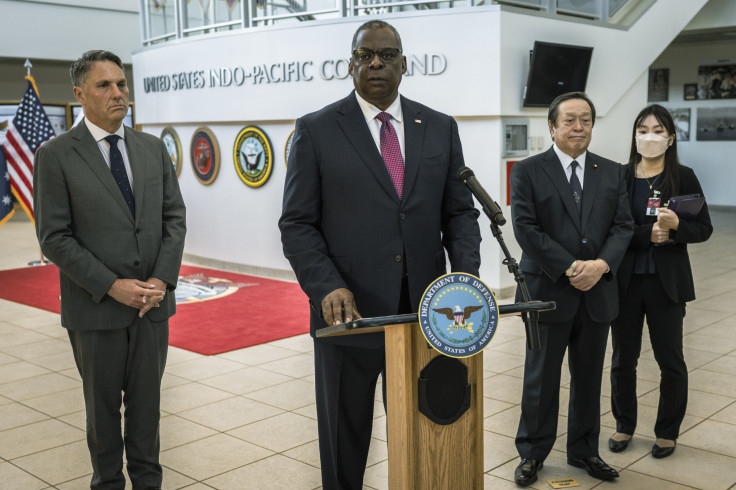US, Australia And Japan Push For Democratic Defense Alliance; India Missing
KEY POINTS
- The U.S. says democracies have drawn closer in the wake of Russia's invasion of Ukraine and Chinese aggressive bullying
- Washington has pitched New Delhi as a key member of its democratic alliance in the region
- The U.S. failed to sway India away from Moscow despite efforts to bolster partnership in defense and security
In an effort to bolster a trilateral alliance amid growing tensions with China, Russia and North Korea in the Indo-Pacific region, Secretary of Defense Lloyd Austin hosted his Australian and Japanese counterparts at the U.S. Indo-Pacific Command headquarters in Hawaii on Saturday. Conspicuously absent in this arrangement is a key member of the Quadrilateral Security Dialogue (QUAD) alliance - India.
Washington has long pitched New Delhi as a key member of the democratic QUAD alliance, as a partner to contain Beijing's growth and aggression in the Asia-Pacific region. However, India's independent foreign policy position, despite Western pressure following the Russian invasion of Ukraine, has led to a growing uneasiness between Washington and New Delhi.
Speaking at the start of his trilateral meeting with Australia's Deputy Prime Minister and Defense Minister, Richard Marles, and Japan's Defense Minister, Yasukazu Hamada, on Saturday, Austin said: "For decades, our three democracies have worked shoulder-to-shoulder as an anchor for stability and prosperity in the Indo-Pacific and around the globe."
The three countries share common values and common purposes, the U.S. Defense Secretary said pointing out, "that vision is threatened by autocratic countries that peddle disinformation and defy international rules and rely on coercion and intimidation."
"We are deeply concerned by China's increasingly aggressive and bullying behavior in the Taiwan Strait and elsewhere in the region," he added.
Expressing similar sentiments, defense ministers of Australia and Japan spoke about strategic alignment and deep affection between the three countries amid Russia's aggression in Ukraine, China's attempts to change the status quo in the Asia-Pacific region and developments in North Korea.
Interestingly, the meeting came just a day after India, along with China, Gabon and Brazil, abstained on a draft resolution tabled by the U.S. and Albania in the UN Security Council. The resolution condemned Russia's "illegal" referendum and annexation of four Ukrainian territories and called for an immediate cessation of violence.
Since the start of the war in Ukraine, the U.S has been attempting to push India to scale down its dependence on Russian military equipment and convince it that the Russia-China axis is not good for India. Although the U.S.-India partnership has grown over the past few years, New Delhi remains wary of Washington as a long-term reliable and trustworthy partner.
Despite pressure from the West, India has sought to pursue an independent position both on the war in Ukraine and Chinese maneuvers in the Asia-Pacific region, focusing on a context-specific approach in dealing with both Russia and China, upsetting expectations that New Delhi would be a strong U.S. ally in the region.
Washington has failed to sway New Delhi away from Moscow, which is a key defense partner and from whom India continues to procure oil, despite Western efforts to sanction. Similarly, with China, amid all its rabble-rousing around Taiwan, India has sought to pursue a diplomatic course to sort out its own border differences with Beijing.
Although QUAD is not an Asian alternative to NATO, India is a very important part of any democratic partnership that the U.S. seeks to build in the region. Without New Delhi, such an alliance would immediately lose the "Indo" in "Indo-Pacific," and with it lose heft and credibility in Asia.

© Copyright IBTimes 2025. All rights reserved.






















